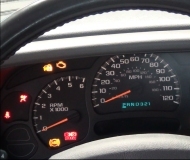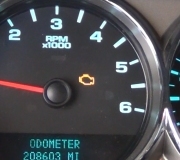This would be a good time for a second opinion. The 2.7L engine has been known for having oiling-system-related issues if the oil isn't changed on schedule, but I thought those engines were only used in Intrepids. I have no experience with them myself.
A rod knock is a loud banging sound that occurs at every revolution of the engine. You won't want to listen to that very long before you dive for cover. If you have an oil pressure gauge on the dash, you will see the pressure drop / pulsate in time with the banging although the gauge might respond slowly enough to dampen out the pulsations.
The grinding sound you mentioned is not typical of engine failure. It IS very typical of a power steering pump, especially if the sound could be considered "buzzing". You can find that by listening through a stethoscope held near the pump pulley or high pressure hose. A noisy pump can last a long time, and it will usually get louder when you turn the steeing wheel all the way to either side.
Belt tensioner pullies can develop noisy bearings too. Instead of having someone just peform a quick listen and develop a serious diagnosis from that, an in-depth analysis would likely start with removal of the power steering / alternator belt, then running the engine. If the noise is gone, the problem is not internal engine problems.
Every engine uses a check valve in the oil supply system to prevent oil from running out of the passages when the engine is off. That check valve could be in the oil pump or in the oil filter. Some aftermarket filters don't have a check valve. They were designed for a specific engine with the check valve built into the pump, yet they will filter the oil just fine in other applications. If there is not a Chrysler (Mopar) filter on the engine, you can't really be sure if it has a check valve. Manufacturers can change their design too, so one brand of filter that worked in the past might not have that valve now, even though it's the same part number. Normally lack of this check valve is an irritation, not a serious problem. The check valve insures there is oil supplied to critical moving parts immediately upon engine startup. Due to the design of the oil passages, there will be oil to those parts anyway when the engine starts.
It's the hydraulic lifters / lash adjusters that normally bleed down when the engine is off. Their job is simply to fill with oil, which is hard as a rock, to take up the slack in the valve train. Parts expand and contract depending on engine temperature. By constantly adjusting, the lifters keep the system quiet by taking up the slack, that's all. When the oil drains down overnight, air gets into the passages and will enter the lifters at engine startup. That results in a ticking noise, and usually goes away in a few seconds.
Engines that use a diffeent lifter design called a lash adjuster can also develop a worn spot on the surface that rides on the rotating camshaft. A pinhole on that worn down surface allows oil to leak out reducing its ability to expand and hold against slack developing in that valve train. If that were to cause a serious problem, I would have changed them on my 1988 Grand Caravan 60,000 miles ago! The fact it sounds like an alarm clock just assures me it's still running, and it gets people out of my way in parking lots!
The mechanic who listened to your engine might be basing his quick diagnosis on previous experience. Still, I would strongly recommend a second opinion, even if it just verifies the first one.
Caradiodoc
By the way, I too am unemployed, and loving it. Thank you, but don't worry about the donation. Think of it as a tip, not a requirement.
SPONSORED LINKS
Friday, March 5th, 2010 AT 11:16 AM





